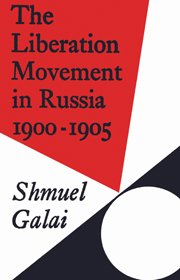Book contents
- Frontmatter
- Contents
- Dedication
- Acknowledgments
- Note on dates, etc.
- List of abbreviations
- Introduction
- Part One ORIGINS
- 1 The origins of zemstvo radicalism
- 2 The beginnings of the zemstvo oppositional movement
- 3 The birth of the democratic intelligentsia
- 4 The parting of the ways
- Part Two THE FORMATION OF THE LIBERATION MOVEMENT
- Part Three WAR AND REVOLUTION
- Appendix A The origins of Beseda
- Appendix B A bibliographical note on the writings of Kuskova and Prokopovich in the years 1898–9
- Appendix C Note on sources on the formation of the Liberation Movement
- Bibliography
- Index
3 - The birth of the democratic intelligentsia
Published online by Cambridge University Press: 22 September 2009
- Frontmatter
- Contents
- Dedication
- Acknowledgments
- Note on dates, etc.
- List of abbreviations
- Introduction
- Part One ORIGINS
- 1 The origins of zemstvo radicalism
- 2 The beginnings of the zemstvo oppositional movement
- 3 The birth of the democratic intelligentsia
- 4 The parting of the ways
- Part Two THE FORMATION OF THE LIBERATION MOVEMENT
- Part Three WAR AND REVOLUTION
- Appendix A The origins of Beseda
- Appendix B A bibliographical note on the writings of Kuskova and Prokopovich in the years 1898–9
- Appendix C Note on sources on the formation of the Liberation Movement
- Bibliography
- Index
Summary
It is necessary to realize clearly that the course of Russian historical development brought about a most peculiar relationship between socialism and liberalism. In all other countries socialism grew up on the soil already prepared by evolution of the regime of legality based on the principles of liberalism and democracy. It was not so in Russia where, after the Decembrists, who were as yet quite unaffected by the ideas and yearnings of socialism, all the ensuing struggle for political reforms became closely intertwined with socialist tendencies and ideas.
(Struve v, p. 573)Russia's intelligentsia, for all its love of freedom and hatred of the tsarist regime, was not known for its admiration of the ‘bourgeois’ freedom of the West. The populists, whose indeterminate ideology dominated the thought of the radical intelligentsia until the mid–1890s if not later, cared very little at the height of their power for such things as constitutions, civil liberties or parliamentary rule.
It was only on the eve of the political débâcle of populism, and as a direct consequence of the peasants' lack of response to the appeals and exhortations of the movement ‘to go to the people’ that the founders of the ill-fated People's Will Party (Narodnaya Volya) and their supporters among the ‘Legal Populists’ discovered the importance of civil liberties and democratic institutions.
- Type
- Chapter
- Information
- The Liberation Movement in Russia 1900–1905 , pp. 58 - 83Publisher: Cambridge University PressPrint publication year: 1973



